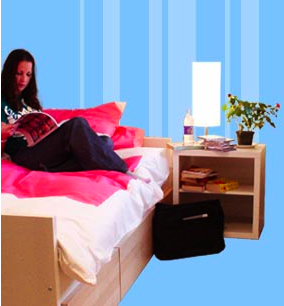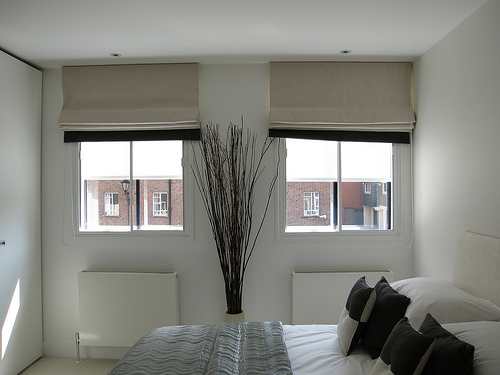Top 5 tips for getting your first student flat
December 15, 2009

When you become a student at any School or University, you may be moving away from your home and your comfort zone. Therefore, one of the first things you need to do, in such a case, is to look for student flats, close to the neighborhood where you will be going to school. Try to get there early to familiarize yourself with the area, and make sure there are other students like you, who also live in the vicinity.
Try to look for accommodations that are popular with students, when you are seeking to find somewhere to live abroad. If you are on a tight budget or you are someone who does not have a car, make an effort to find somewhere within walking distance to the university or college you will be attending.
Here are some guidelines to know follow when you are researching for your new accommodations and the top 5 tips for getting a student flat:
1# There are a limited number of flats for rent that are available, so make sure you start your research early, perhaps even in the summer, before school starts.
#2 Many schools and universities in the UK offer private accommodations for single students, students who are couples without children, as well as student-families with children, so make sure you request the appropriate flat.
#3 Look online if you live overseas and try to contact your landlord or rental agent, either by phone, or online, before you make your trip. Local newspapers, classified ads sites and property search sites such as vivastreet are great places for student lets. Also check out the official student housing pages for some tips and advice.
#4 Property managers usually know that students cannot afford paying high rents, so make sure you let them know that you are a student looking for an inexpensive flat; that way they will be very accommodating.
#5 When you become a student at any School or University, you may be moving away from your home and your comfort zone. Therefore, one of the first things you need to do, in such a case, is to look for student property to rent within the neighborhood where you will be going to school. Your flat should also be close enough to the school or university campus, and sometimes even within walking distance.
The Smart Student Finance Guide
August 17, 2008
 Leaving home for the very first time brings more than just the long awaited freedom: there are now books to read and study papers to draft, classes to attend and schedules to keep. In addition, for the very first time the average student will come face to face with the bills that need to be paid for everyday commodities such as rent, electricity, and laundry. Students who may have looked forward to university, but might not have considered the intricacies of fiscal responsibility, will benefit greatly from the five steps that will help with becoming money smart quickly and easily.
Leaving home for the very first time brings more than just the long awaited freedom: there are now books to read and study papers to draft, classes to attend and schedules to keep. In addition, for the very first time the average student will come face to face with the bills that need to be paid for everyday commodities such as rent, electricity, and laundry. Students who may have looked forward to university, but might not have considered the intricacies of fiscal responsibility, will benefit greatly from the five steps that will help with becoming money smart quickly and easily.
1. Open a student bank account that meets all of your need at the minimum costs possible. You may want to favor one bank over another because of the freebies that are used as incentives for university students bringing their business there, but no CD or cinema ticket is worth the cost of an account that gradually eats away at the value of free items with fees and costs of doing business. On the other hand, some incentives – when coupled with advantageous student account terms – make for attractive and money saving offers.
2. Work on your budget. Know how much money you will receive on a monthly basis and then set up a list of all expenses. Your expenses cannot be more than your incoming funds, and it is important to make the budget and then follow it. Online budget planners are a good way of inputting schedules for paying your tuition fees and also rent and other expenses. This prevents any last minute surprises and will not catch you halfway through the month with no money left.
3. Find a job. Even as your primary job is getting a good university education, a secondary job that brings in money is oftentimes the only way to make ends meet. In addition to helping with defraying some of the costs you incur during your education, you are gain valuable work experience and references, which will come in very handy after graduation.
4. Open a savings account to help with the big ticket expenses. Payments on your student loan will come due thrice in a year, and having this much money in you main operating account might tempt you to buy things you really should not spend any money on. A secondary savings account will put the money out of harm’s way, let it earn some interest, and allow you to contribute to it at regular intervals. When the student fee payment comes due, you do not have to scramble but have your funds ready.
5. Save money in the right places. Second hand buying is synonymous with student living, and skimping in the right places can save you substantial sums of money. Books almost always can be had second hand, and the same is true for a bike and basic appliances. Always check for deals at the grocery store, and make use of group discounts at clubs and other venues.
Graduate guide to renting a property
May 3, 2008

As a recent graduate, you will be looking for a place to live, and chances are you will be starting off by renting a flat or studio. So what should a graduate look out for when viewing a rental property?
Below is a thorough guide to the different things you should keep in mind when viewing a property to let.
1. Before viewing
Always try to go to a property viewing with a friend, it is not only safer but it also means you will get a second opinion, and more chances to pick out flaws you may not have seen. If you want to be even more careful, let friends or family know where you are going in case and keep a taxi number for the way back.
2. Viewing the flat: Take your Time
Estate agents might try to rush you through a viewing, especially during peak hours. In our current high demand rent market, this is your only opportunity to judge the place, so don’t be afraid to take your time and ask as many questions as possible. Remember that Estate agents will appreciate a curious buyer, who knows what they want.
Try and prepare questions before you view your property, you will find that the more properties you view the more questions you will be asking based on previous experience. A good idea is to draw up a check list to take along, and to bring in a notepad to take notes.
If you sign the lease you will be doing so based on your viewing, meaning if you didn’t check the water pressure or notice the lack of radiators, there wont be a lot you can do about it once you’ve signed the contract.
3. The Local Neighboorhood
See if you can show up slightly early to allow yourself a look around and get a feel for the area. Try and revisit at different times to check whether the area is well-lit? If its a safe environment or will you feel isolated and vulnerable?
Find out about the local Amenities: Shop, Tube stations, parks, cashpoints, bus stops, banks and parking are all very important factors to look for.
Availability of public transport is one of the most important points: How far is the nearest stop? How frequent and reliable is the tube or bus service and does it operate in the evenings and at weekends? Many stations close earlier on weekends, and this might impact your socialising in the evenings or taxi expenses! How much is a monthly season card – don’t forget to cost the commuting factor into your monthly outgoings.
4. Viewing the Property & its condition
Take time to look for signs of damp in all rooms – usually telling signs are a musty smell, flaking paint, loose wallpaper, spots on the walls.
Look for any signs of mice infestation by looking for droppings, traps or poison baits – don’t forget to check for this in ground floor cupboards.
Is there central heating, and do all the heaters and radiators work? If the property doesn’t come with central heating is there an alternative source such as storage heaters/electric heating? Is central heating included in your rent?
Is there double glazing in your new flat? If not, check if the area is quiet. Not having double glazing means sleepless nights on busy streets and higher heating bills.
Are the general decorations to your taste? Look at paint, wallpaper, carpets, floorboards are they in reasonable condition and check if you would be allowed to carry out any decorations if not?
Check for space, especially if you plan on moving a lot of stuff from home. Is there adequate storage space in the property? Does the kitchen have enough surface & storage space for your needs?
Finally we would recommend as a graduate that you visit the property more than once and at different times of the day to check that they are happy with the area. Other than that, happy flat hunting.
Welcome to graduate finance
May 2, 2008

Welcome to graduate finance, your guide to all things important to recent graduates.



